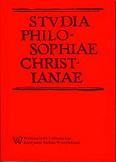Correlations between phenomenology and metaphysics in French philosophy
Correlations between phenomenology and metaphysics in French philosophy
Author(s): Ryszard MońSubject(s): Philosophy
Published by: Wydawnictwo Naukowe Uniwersytetu Kardynała Stefana Wyszyńskiego w Warszawie
Keywords: metaphysics; phenomenology; first philosophy; French philosophy
Summary/Abstract: Significant modifications to the understanding of phenomenology were introduced in the second half of the twentieth century in France. Some even speak about a theological turn, which may appear odd when the enlightenment tradition of this country is taken into consideration. The present work focuses mainly on the views of two thinkers, who seem the most representative of the changes, Jean-Luc Marion and Michel Henry. There is much evidence to support the claim that Husserl himself played a role in the changes as his views gave rise to certain interpretative doubts. He did not manage to free himself entirely from metaphysics as first philosophy. Thus many philosophers regarded phenomenology as unreliable, since its conclusions, they claimed, are too subjective and relative when it comes to determining sense. The author investigates whether the understanding of philosophy, and – to be more precise – the attempted transition to metaphysics proposed by the two philosophers is correct. The author discusses also to what extent the differences that occurred resulted from the translation from German into French. The analysis of the conceptions of the two philosophers is placed against a historical background. By referring to the work of philosophers such as Eckhart, Heidegger or Bergson, the author concludes that the main objection was raised not because Husserl proposed a new method, nor even because he referred to eidetics with all its restrictions, but because he claimed that pure phenomenology, considered as a science, can be solely the study of essence and absolutely not the study of existence. It is of no surprise that first Merleau-Ponty, and then Henry, Marion, and Ricoeur wanted to open philosophy to these dimensions, while saving phenomenological restrictions. Phenomenology opened its doors and became something between sciences and more speculative metaphysics. And this caused the theological turn.
Journal: Studia Philosophiae Christianae
- Issue Year: 47/2011
- Issue No: 2
- Page Range: 103-121
- Page Count: 19
- Language: English

